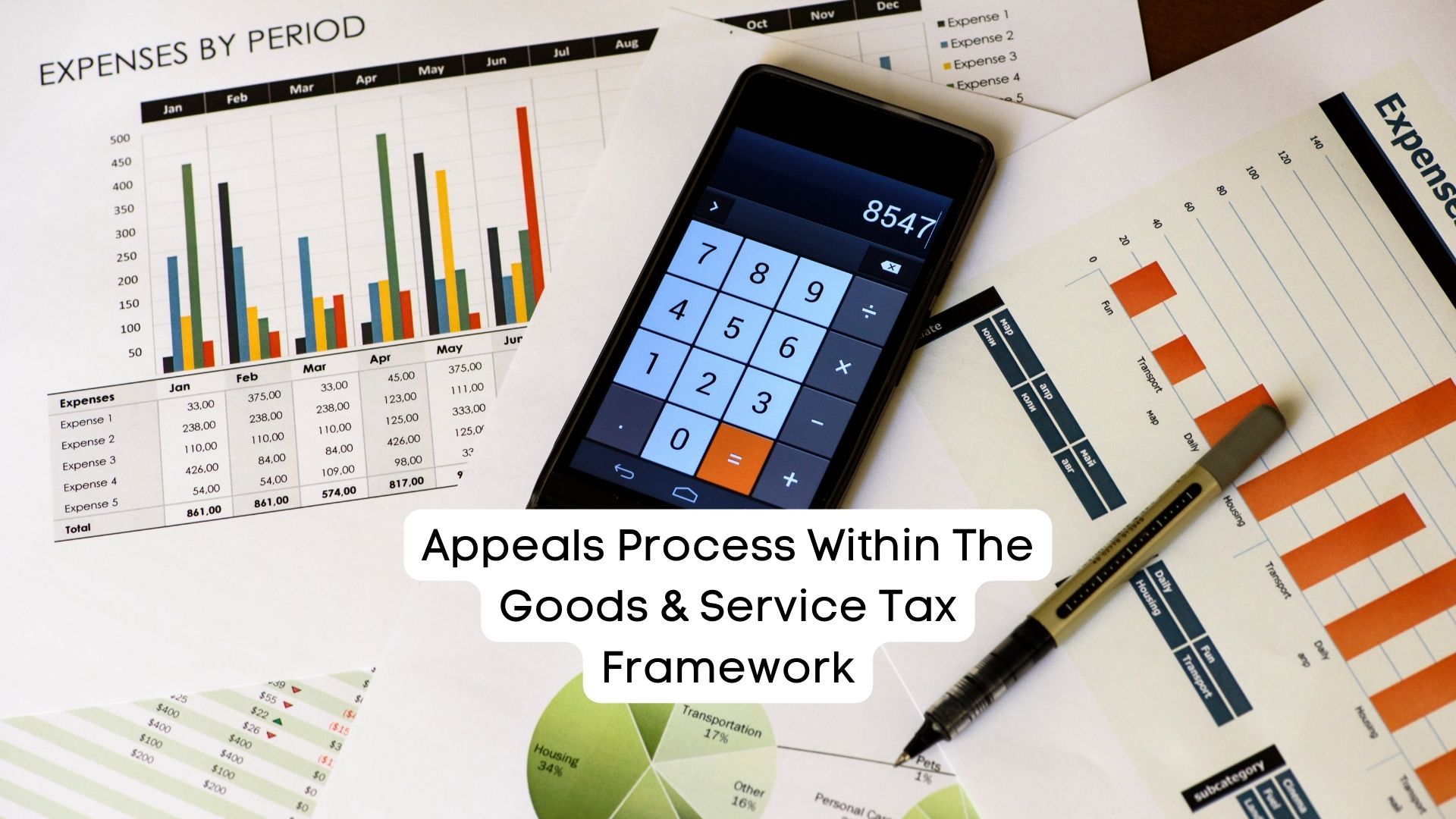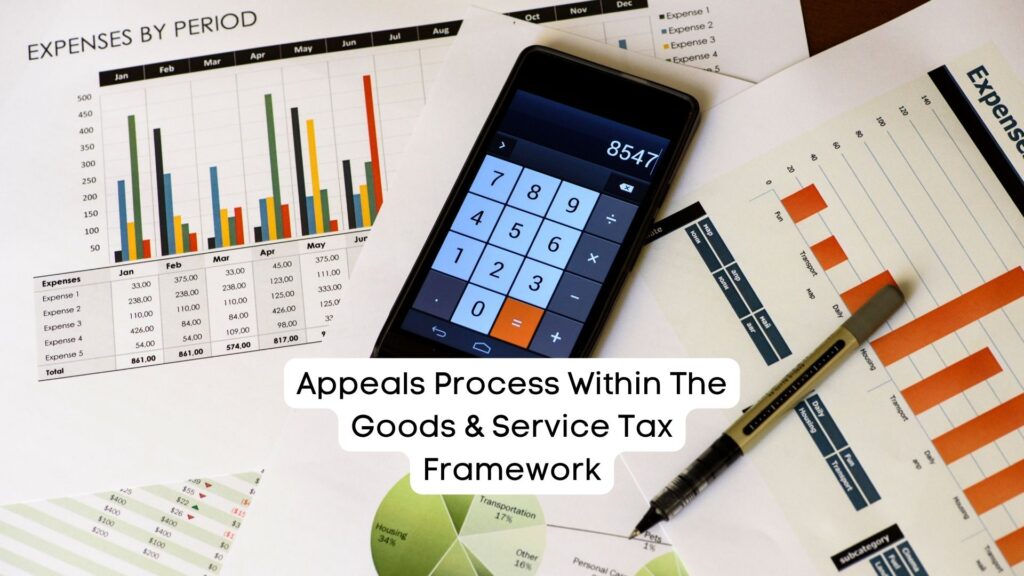
20 Feb Appeals Process within the Goods & Service Tax Framework

This articles focuses on the appeals process within the Goods & Service Tax (GST) structure. For both business proprietors and tax professionals, traversing the appeals process can prove to be quite intricate. However, comprehending the nuances of appeals is imperative to ensure equitable resolutions while mitigating financial and operational ramifications. Within this discourse, we aim to demystify the appeals protocol under GST, equipping you with the insights necessary to effectively contest unfavorable decisions rendered by tax authorities. Whether your aim is to rectify an assessment, challenge a penalty, or settle other GST-related disputes, our aim is to assist you in streamlining your appeals journey. Let us embark on an exploration of the intricacies of appeals under GST, encompassing procedures, documentation requisites, and the available avenues for redressal.
Deciphering Appeals within the Realm of Goods & Service Tax
An appeal within the Goods and Services Tax (GST) realm pertains to the legal recourse accessible to taxpayers dissatisfied with decisions made by tax authorities concerning their GST obligations. It serves as a mechanism through which taxpayers can contest and petition for a reassessment of adverse determinations, such as erroneous assessments, imposition of penalties under GST, or disputes pertaining to GST compliance.
Understanding Disputes
In any legal framework, including taxation laws, obligations are imposed. These obligations typically fall into two categories: tax-related or procedural. Tax authorities ascertain taxpayers’ adherence to these obligations through audits, anti-evasion measures, examinations, etc. Instances of genuine or perceived non-compliance may arise occasionally. In scenarios where a persistent disparity in opinion exists, a dispute ensues, necessitating resolution. Initially, such disputes are addressed by departmental officials through a quasi-judicial process, culminating in the issuance of an initial order known by various titles, including assessment order, adjudication order, or order-in-original. The GST Act delineates the “adjudicating authority” as any entity vested with the power to issue orders or decisions pursuant to this Act, excluding the Board, the First Appellate Authority, and the Appellate Tribunal.
Navigating the Steps of Appeals under Goods & Service Tax
Appeals can be lodged with the following authorities in the specified sequence:
- If the order is issued by the Adjudicating authority, the appeal lies with the first Appellate Authority.
- If the orders are rendered by the First Appellate Authority, the appeal lies with the Appellate Tribunal.
- If the orders are issued by the Appellate Tribunal, the appeal lies with the High Court.
- If the orders are handed down by the High Court, the appeal lies with the Supreme Court.
Should Both CGST and SGST Officials Be Consulted in Every Appeal?
No. According to the GST Act, both CGST and SGST/UTGST authorities have the authority to issue orders. A decision made under CGST will be deemed to apply to SGST under the Act. However, if a CGST officer has decided, only CGST officials have the authority to appeal, review, revise, or correct the decision, like the SGST.
Process of Filing Appeal to Appellate Authority
Following is the process of filing appeal:
- Prepare Appeal Documentation: Gather the order or decision from the lower tax authority, relevant invoices, supporting papers, legal provisions, and any other evidence that supports your argument.
- Formulate Appeal Grounds: List the reasons you are appealing the lower tax authority’s decision or order. Errors in tax assessment, fines, Goods & Service Tax law interpretation, and other legal or factual differences.
- Complete Appeal Form: Follow the appellate authority’s appeal form instructions. Fill in your contact information, the contested order, and the appeal grounds.
- Attach Supporting Papers to the Appeal Form: Invoices, financial accounts, tax authority correspondence, and other relevant information may be included.
- Pay Appeal Fees: Calculate and pay the appeal fees according to the fee structure. Pay in the designated manner and attach the proof of payment to the appeal form.
- Submit Appeal to Appellate Authority: Within the deadline, submit the appeal form, accompanying papers, and proof of payment to the appellate authority. Avoid procedural difficulties by meeting deadlines.
- The Appellate Authority will Acknowledge Receipt of the Appeal: The authority will then provide additional instructions, such as the hearing date and time or appeal papers.
- Attend the Hearing: Attend a planned hearing on time. Present your case to the appellate authority, arguing, supporting, and answering questions.
Decision:
The appellate authority will decide after reviewing the hearing’s facts, evidence, and legal provisions. Based on the merits, this decision will uphold, modify, or revoke the lower tax authority’s order.
Follow the Order:
Follow the decision’s instructions within the deadline. The appellate authority may require paying amended tax liabilities, filing returns, or other steps.
Time Limit for Filing a GST Appeal
A requester has three-month time from the day the contested order was communicated to file an appeal with the appellate authority. If the Appellate Authority is convinced that there was a legitimate reason for the delay, they may also excuse it for up to one month.
General Rules for Filing GST Appeals
All appeals must be filed using the appropriate paperwork and fees. Fee will be equal to the whole amount of tax, interest, fines, penalties, and other costs related to the challenged order, as acknowledged by the appellant, plus 10% of the amount in dispute. Fees are not charged in circumstances when an officer or the Commissioner of GST appeals.
Can an Authorized Representative Appear in Court?
Yes. Unless compelled to do so by the Act, any individual required to appear before a GST Officer, First Appellate Authority, or Appellate Tribunal may designate an authorized representative to appear on his or her behalf. An authorized representative could be a:
- A relative
- A regular employee
- A lawyer practising in any court in India
- Any chartered accountant/cost accountant/company secretary, with a valid certificate of practice
- A retired officer of the Tax Department of any State Government or of the Excise Dept. whose rank was minimum Group-B gazetted officer
- Any tax return preparer
- Retired officers cannot appear in place of the concerned person within one year from the date of their retirement.
Certain Cases in Which Appeal Cannot Be Filed
To control the appeals, process and save needless legal costs, the Board or the State Government may, at the Council’s advice, set monetary limits for appeals by the GST officer. The following decisions made by a GST officer cannot be appealed:
- An order to transfer the proceedings from one officer to another officer.
- An order to seize or retain books of account and other documents.
- An order sanctioning prosecution under the Act; or
- An order allowing payment of tax and other amount in instalments
Anyone who disagrees with a decision or order made against him under the GST may appeal it to the First Appellate Authority. If they disagree with the First Appellate Authority’s ruling, they may file an appeal with the National Appellate Tribunal, the High Court, and then the Supreme Court.
Withdrawal of a GST Appeal
It was determined to offer the option of withdrawing an existing Goods & Service Tax appeal at the 48th GST Council meeting. The goal of this action was to lessen the workload of the appellate authorities by lowering the volume of litigation. A new Rule 109C was added to the CGST Rules in this regard by Notification No. 26/2022-Central Tax.
According to Rule 109C, the applicant may apply for the withdrawal of an appeal at any time prior to the issuance of the show cause notice or order under Section 107(11), whichever occurs first. Any appeal submitted in Form GST APL-01 or Form GST APL-03 is addressed by this. The new Form GST APL-01/03W must be used to make the request to withdraw the appeal.
Takeaway
In conclusion, appeals under the Goods & Service Tax (GST) system play a vital role in ensuring a fair resolution for tax-related disputes. Appeals under the Goods and Services Tax (GST) system can be complicated, but with the correct knowledge and advice, you can confidently navigate the procedure. By familiarizing yourself with the legal provisions, timelines, and necessary documentation, you can effectively present your case and seek a favorable outcome.


No Comments